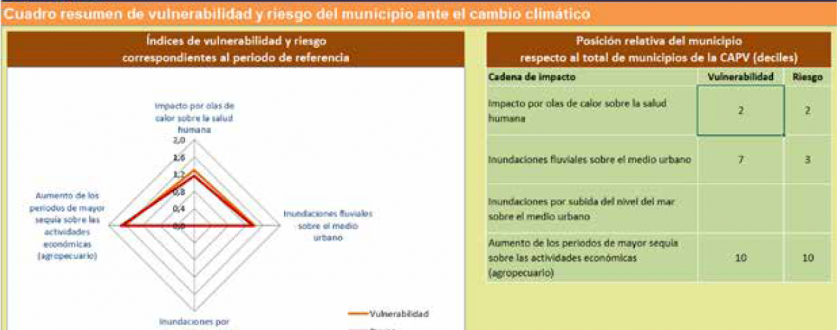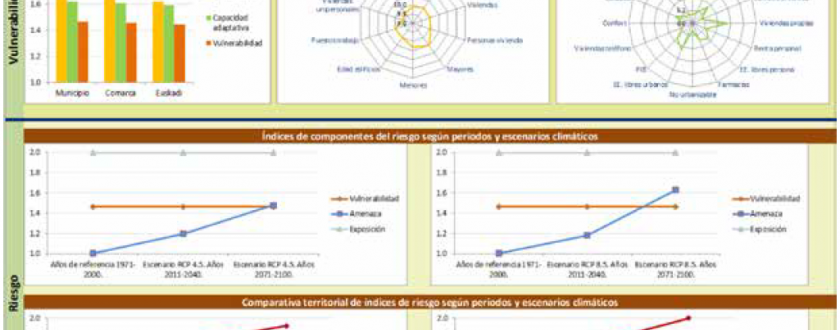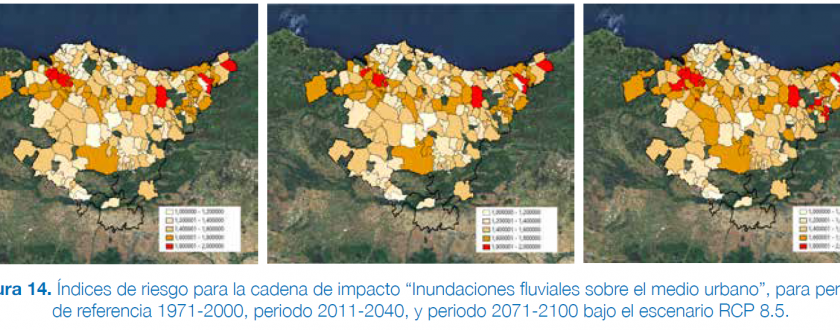Vulnerability and risk assessment for Basque municipalities in the face of climate change
Description of the case study
In order to evaluate the vulnerability and risk to BAC municipalities in terms of climate change, a series of more specific tasks have been carried out, which are summarised here:
» Revising the methodological approach and data model from the previous BAC municipality vulnerability analysis (2010).
» Revising the problem diagram, the key climate threats, and possible sectors that will be most affected, which have been identified in the 2050 KLIMA Strategy.
» Producing a database of municipal indicators geared towards the selected impact chains.
» Carrying out a quantitative evaluation of vulnerability and risk when it comes to BAC municipalities, based on indicators.
» Producing a large collection of geographic data and cartographic outputs.
» Producing a summary sheet for each BAC municipality.
» Proposing an overall indicator of adaptation measures, thereby identifying the type of measure and sector to which it applies.
Identifying public and universal indicators, meaning that they are applicable to all Basque Country municipalities, and are specifiers of threat, exposure, sensitivity, and adaptive ability. To do this, indicators from previous international studies were used and adapted to the framework of Basque Country indicators.
The main objective of the project was to carry out a climate change risk and vulnerability assessment for BAC municipalities. Knowledge on which municipalities and what measure can be affected by the main current and future climate threats is of great interest, and helps implement mechanisms and policies to effectively respond on different scales. This knowledge helps municipal entities prioritise their impacts, take specific measures and complete detailed studies to challenge climate change plans and secure international commitments. It is also useful for supra-municipal entities in terms of prioritising municipalities and impacts.
The results obtained have allowed for a comparison between municipalities to be carried out, identifying those whose climate change risks and vulnerabilities are more important according to the selected impact chains and future climate scenarios.
Public data from official sources updated with total coverage for 251 BAC municipalities was chosen for the creation of indicator databases.
In addition, the risk analysis of the different impact chains is a new aspect, and was carried out from a perspective of multiple scenarios. This way, the results allowed for differences between the various municipality indices to be detected, and possible long-term change trends to be shown.
The methodological resources and results that this study offer can allow for better informed urban planning and land planning decision making, with the aim of anticipating possible climate change impacts and increasing the region’s resilience and efficiency.
Case study developed and implemented as a climate change adaptation measure.
Ihobe, TECNALIA Research & Innovation
Additional Information
The tool was presented to the municipalities through the Udalsarea 2030 Basque Network of Sustainable Municipalities, and was put into practice with some pilot projects.
No assessment has been made yet on success and limiting factors.
No cost/benefit study has been carried out, however considering that some municipalities are already using the information, and that some supra-municipal entities are including this information in their planning (Territorial Plot Development Plans), the benefits come from two areas:
• The savings arising from not every municipal council and every supra-municipal entity having to do this work on their own.
• The savings derived from the adaptation measures taken as a result of its application.
• It is therefore hoped that the benefits will greatly outweigh the costs.
The Basque Country takes part in different international initiatives where climate change adaptation is the key focus of action, as is the case with Compact of States and Regions3 of the Lima Summit (COP20)4, and the RegionsAdapt5 initiative in 2015.
This institutional support can be seen in the Basque Autonomous Community (BAC) itself, with the writing of the Basque Country Climate Change Strategy (KLIMA 2050)14, approved in 2015.
Assuming that various impacts are expected in BAC municipalities, classifying this type of impact and the level of Basque municipality vulnerability is of great importance when it comes to aligning current plans and actions, and proposing new ones for the future to facilitate a transition towards more resilient municipalities.
2017 - 2019 (2 years - completed)
Reference information
PYRENEAN CLIMATE CHANGE OBSERVATORY
Avenida Nuestra Señora de la Victoria, 8
22.700 - Jaca
Huesca - España
+34 974 36 31 00
info_opcc@ctp.org







